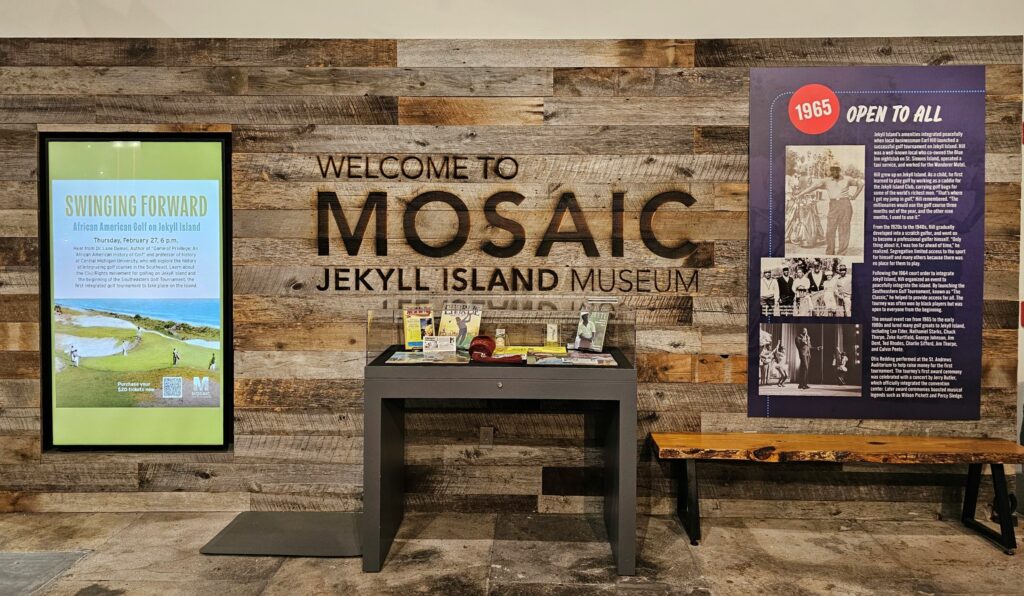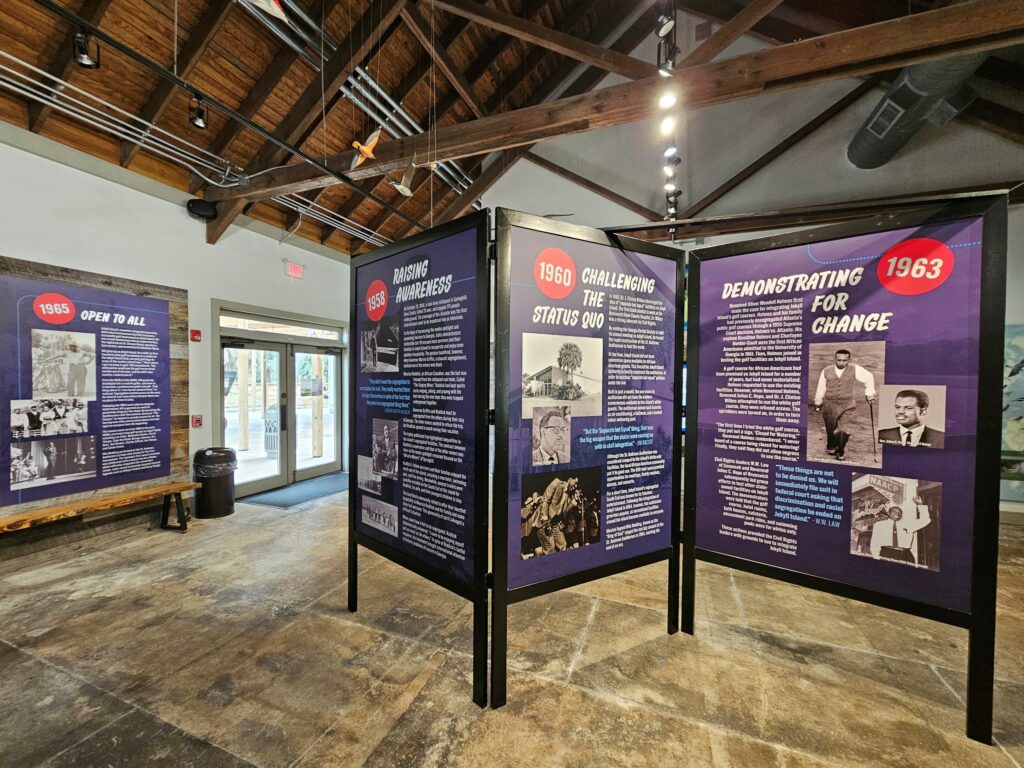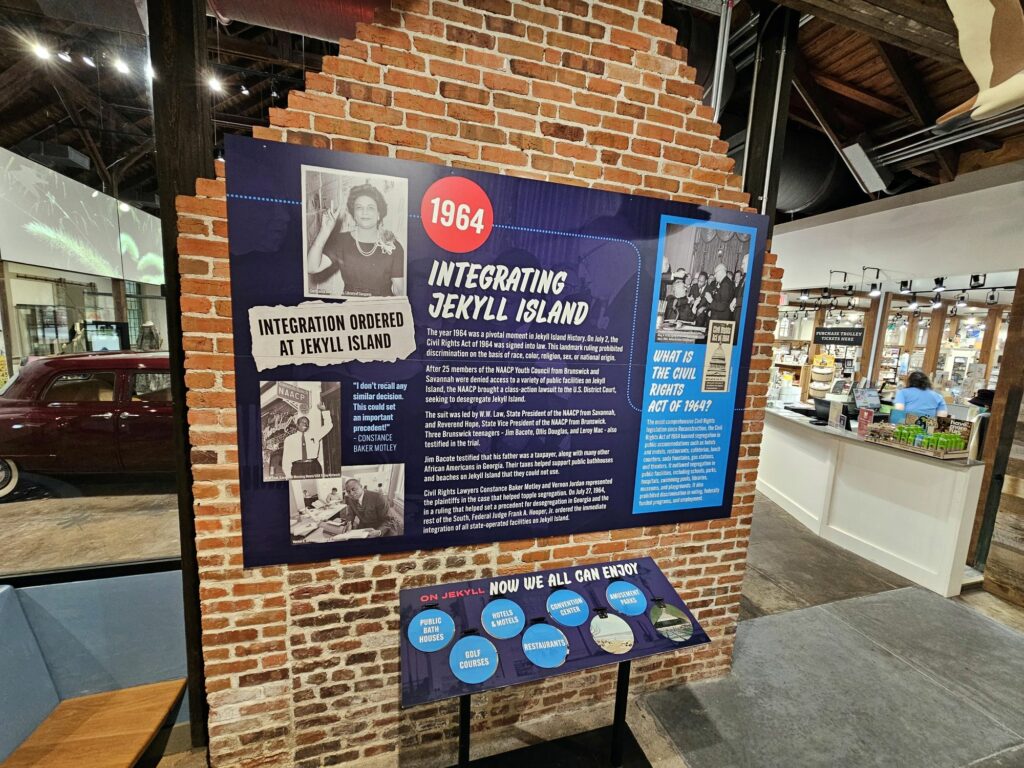by Patrick Carmody, Museum Educator
July 2nd, 1964, President of the United States Lyndon B. Johnson signs the Civil Rights Act into law, bringing an end to an era of legal oppression and segregation in public spaces. That same month Jekyll Island was having its own Civil Rights case being argued, Civil Rights leaders including W.W. Law, President of the Savannah NAACP, and Civil Rights lawyers Constance Baker Motley and Vernon Jordan, successfully argued in the court of Judge Frank Hooper for the desegregation of Jekyll Island State Park. Until that point, Jekyll Island’s guests had been separated based on race, with the southern portion of the island reserved just for African Americans, and everything north of St. Andrews Beach on Jekyll was exclusively for White guests and residents.
The northern two-thirds of Jekyll used by whites offered access to many great amenities including the Aquarama, Gould Auditorium, several hotels and restaurants, the Jekyll Island Museum, and all of Jekyll’s golf courses. The Black portion of Jekyll Island was much more limited in its offerings, with the Dolphin Club Hotel, St. Andrews Beach, the Beach Pavilion, and the St. Andrews Auditorium being the only avenues for enjoyment.
With no accessibility to the exclusive amenities on the “Whites only” portion of the Island, the early years of the 1960s saw Civil Rights activists begin testing the enforcement of segregation on Jekyll Island. Access to the golf courses was denied to several people under various excuses, such as staff putting out a sign stating the course was “Closed for Watering”. Another time when a group looking to enjoy golf were told they couldn’t play because they were black, and the golf courses sprinklers were switched on to deter the group from playing for the day.
Swinging Forward: African American Golf on Jekyll Island – February 2 @ 6:00 pm
Dr. Lane Demas, author of Game of Privilege: An African American History of Golf and a professor of history at Central Michigan University, will present the History of African American Golfers in the Southeast and on Jekyll Island! Dr. Demas will highlight the history surrounding integration of golf courses in the Southeast during the 1950s and 1960s, Jekyll’s history with integrating golf, and the beginning of the first integrated golf tournament on the island, known as The Southeastern or the Classic. This lecture will be held on the 2nd floor of the Golf Clubhouse on February 27th at 6 PM.
All of these incidents of denial to Jekyll’s offerings for African Americans culminated into a Federal Court Case, with its verdict delivered on July 27, 1964, by Judge Frank A Hooper Jr. Jekyll Island was to be immediately integrated. Full accessibility from the Clam Creek Pier to the southern tip of Jekyll Island was made the law of the land, with Jekyll truly becoming a State Park for every Georgian to enjoy, regardless of skin color.
To celebrate this incredible moment of history, the 60th anniversary of the Civil Rights Act, and the desegregation of Jekyll Island, Mosaic Museum’s lobby exhibit was transformed to show the unique history of African Americans from this era. Everything from the story of Maurice Ruddick to the creation of St. Andrews Beach, and the history of the Southeastern Golf Tournament, are on display at Mosaic, Jekyll Island Museum and are well worth a visit.
The Wander at St. Andrews – February 1 and 8, 10:00 am and 2:00 pm
The Wander St. Andrews is a guided walking tour of the Wanderer Memory Trail, elaborating on the history of the Wanderer Incident, the history of the survivors, and the Gullah-Geechee. In addition to this history, a guided tour of the St. Andrews beach park will highlight the beautiful ecosystem, the plant life, and the dynamic landscape of the south end.
More information …
Black History on Jekyll Island
The African American roots of Jekyll Island run deep and trace back hundreds of years. Explore the lives of those that shaped the course of history and the progress they made possible, as told by Mosaic, Jekyll Island Museum.
Dolphin Club Days – June 14 and 28
Dolphin Club Days tours will return this summer with the return of musician Ace Winn to perform live music. An experience YOU DON’T WANT TO MISS!





